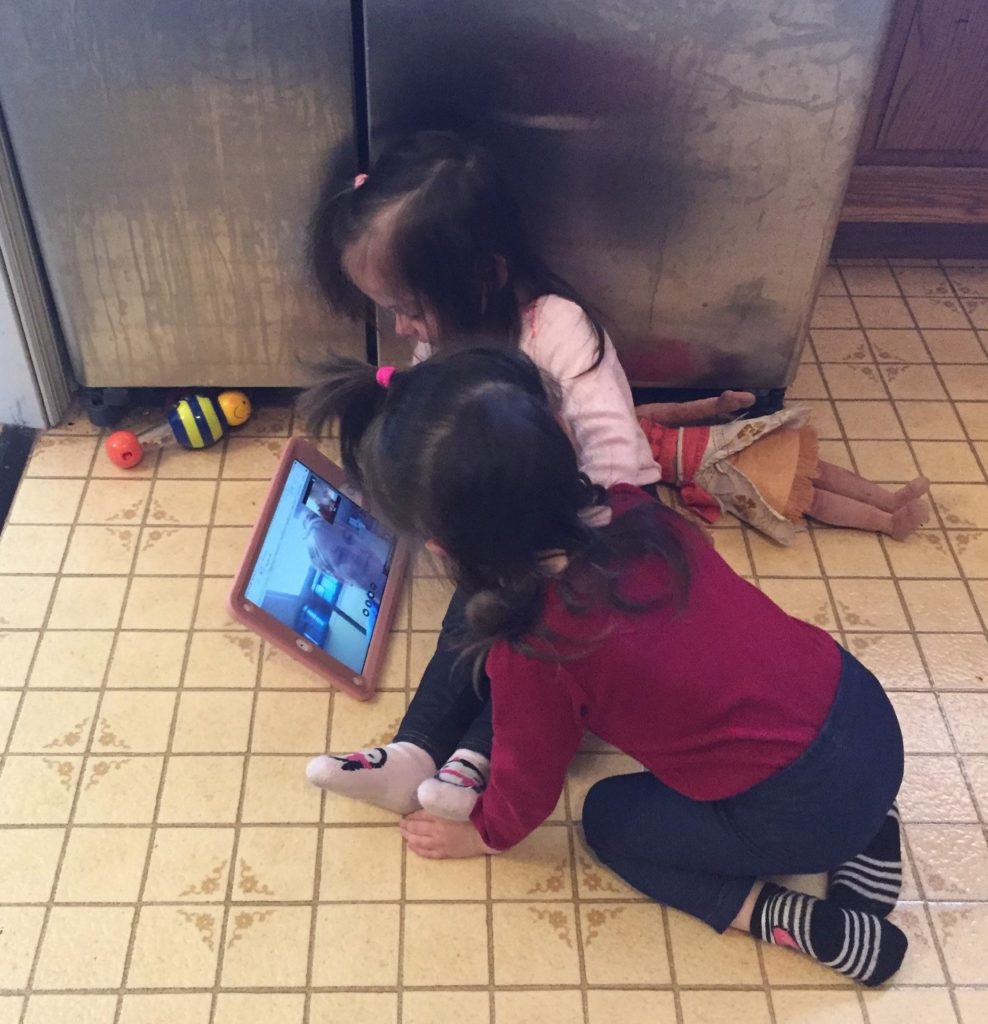By Elisa Anderson, MS, CCC-SLP
Early Intervention supports are continuing in Lancaster County! When I first heard that Early Intervention services would be switching to a tele-intervention model, I was less concerned than many of my peers that I spoke to. In a previous job, I had help to pilot a new tele-therapy program for school-aged students diagnosed with Autism Spectrum Disorder or emotional/behavioral disorders. Because of this experience, I convinced myself that I was prepared for this. “I’ve already done this; how different can it be?” I said to myself. In some ways, I was correct. I was mostly prepared for the technological aspects of moving toward a tele-intervention model. What I wasn’t prepared for was the reality of coaching via tele-intervention.
In addition to being a Speech-Language Pathologist, I am also a mom to three wonderful young children, all of whom receive some type of Early Intervention service. My son is three years old and receives multiple therapies through the IU. I also have twin two-year-old daughters who receive Speech Therapy through Excentia Human Services. It was through my exposure to Infant & Toddler early intervention with my kids and the wonderful therapists who have supported and continue to support them that I came to Excentia Human Services to join the Early Childhood team.
In many ways, tele-intervention services for my children are similar to how they were when our speech therapist was coming to our house. We talk about how things are going and what we want to address, the therapist will offer suggestions about how we might achieve our stated goal and then we try them to see how it works, and our therapist provides feedback on how we’re doing and how we might tweak it a little to work better. What is different is finding new ways to keep my kids engaged in the process. There is a lot of chasing my kids down with the iPad so that our therapist can see what they are doing or dragging them back in front of the screen to participate. Some days, my kids do well and will sit in front of the screen. Lily, in particular, loves to look at the smaller picture of herself on the screen. Other days, it is a struggle to get them to do even one activity and the therapist and I will often change our approach and try reflecting together on our common goals and sharing ideas for how to reach them while the kids run around.
In my professional life, I have found that tele-intervention is a trial by fire experience in coaching. Early Intervention utilizes a coaching model in which therapists work with families toward a common goal of improving functioning across a variety of areas (communication, physical development, social skills, play skills, etc.). As a relatively new Infant & Toddler therapist, I was adjusting to the change of coaching families as opposed to directly working with children, which I had spent most of my previous professional life doing in the schools. I was just starting to feel confident in my ability to coach families and be successful in meeting shared goals and then everything shut down. Shifting the coaching that I had been doing to a tele-intervention model was nerve-wracking in the beginning. Without being with a family, how could I offer anything of value that would help to improve the communication skills of the children I work with? But after nearly two months of quarantine, that feeling has faded. I feel as though I have become a better, more in-tune, and more empathetic therapist through this process. I have learned that I do still have valuable input to offer the families that I work with and I am happy and proud to say that many of the children that I work with are doing well and adjusting well to this new normal!
So as a therapist providing services, and a mom receiving services, what advice can I offer to my fellow therapists and fellow parents about getting the most out of tele-intervention services? Here are my overall insights after many weeks of doing tele-intervention from both sides.
To my fellow therapists:
- Don’t be afraid to ask questions. I can’t tell you the number of times I have reached out to my fellow speech pathologists or other therapists with coaching questions since beginning tele-intervention.
- There is a wonderful world of resources out there to help with adjusting to this new normal for all of us. There are webinars and articles and all sorts of information on both the technical and therapeutic aspects of tele-intervention and how to provide services through technology.
- Remember you are still the same therapist you have always been. You have tremendous knowledge and insight to share. You CAN do this.
- Finally, please be patient with your families. We are all learning how to do this and sometimes our children are not as cooperative as we would hope. As a mom, I am filled with anxiety about whether my kids will participate, if will we be able to practice skills, if I can attend to the video chat while also keeping my kids from getting into trouble…and the list goes on and on.
To my fellow parents:
- Please don’t worry about what your house looks like. Trust me when I tell you that I am not looking. I am more concerned with making sure that I am paying attention to what is going on with your child and making sure that everything goes smoothly with the session and accompanying paperwork to even notice.
- Feel free to ask questions, make suggestions, and be honest with your therapist if you are feeling overwhelmed. We completely understand if you are struggling with new skills, finding time to practice, or scheduling. We are here to help.
- Please be patient with your therapist. This is a totally new world for most of us. We are juggling technology, a new method of coaching, and all the fun that comes with the practical side of tele-intervention and sometimes we get overwhelmed too.
- I cannot encourage you enough to be open to the possibilities of tele-intervention. It may seem intimidating at first, but I urge you to give it a try, even maybe just a short session at first to get used to it. We are flexible and I’m sure that your therapist can find a way to work with you that will work for everyone. You are not alone in this. In many ways, tele-intervention is not that terribly different from what you are used to.
If you have any concerns regarding your child’s development, know that Early Intervention is still here to help you in whatever way may work for your family at this time. You do not have to wait to start the process. For a free eligibility evaluation for your child (ages birth to three years old) in Lancaster County please call 717-735-1547.



